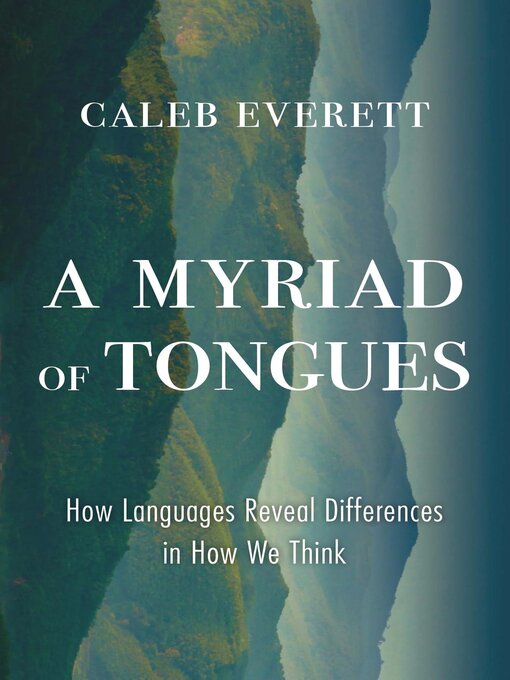"An assured guide" (New Scientist) to the relationship between the language we speak and our perception of such fundamentals of experience as time, space, color, and smells.
We tend to assume that all languages categorize ideas and objects similarly, reflecting our common human experience. But this isn't the case. When we look closely, we find that many basic concepts are not universal, and that speakers of different languages literally see and think about the world differently.
Caleb Everett takes readers around the globe, explaining what linguistic diversity tells us about human culture, overturning conventional wisdom along the way. For instance, though it may seem that everybody refers to time in spatial terms—in English, for example, we speak of time "passing us by"—speakers of the Amazonian language Tupi Kawahib never do. In fact, Tupi Kawahib has no word for "time" at all. And while it has long been understood that languages categorize colors based on those that speakers regularly encounter, evidence suggests that the color words we have at our disposal affect how we discriminate colors themselves: a rose may not appear as rosy by any other name. What's more, the terms available to us even determine the range of smells we can identify. European languages tend to have just a few abstract odor words, like "floral" or "stinky," whereas Indigenous languages often have well over a dozen.
Why do some cultures talk anthropocentrically about things being to one's "left" or "right," while others use geocentric words like "east" and "west"? What is the connection between what we eat and the sounds we make? A Myriad of Tongues answers these and other questions, yielding profound insights into the fundamentals of human communication and experience.
-
Creators
-
Publisher
-
Release date
September 19, 2023 -
Formats
-
Kindle Book
-
OverDrive Read
- ISBN: 9780674295193
-
EPUB ebook
- ISBN: 9780674295193
- File size: 1176 KB
-
-
Languages
- English
-
Reviews
-
Publisher's Weekly
Starred review from June 19, 2023
University of Miami anthropologist Everett (Numbers and the Making of Us) analyzes how language affects thought in this stimulating deep dive. Drawing on research on Indigenous peoples across the globe, Everett argues that their languages challenge linguists’ assumptions about “universal” features of grammar. For example, the Yucatec Mayan and Paraguayan Guaraní have no tenses, while the Amazonian Yagua language has eight, including five past tenses that indicate how long ago a described incident occurred. “Languages tend to reflect the environments in which they evolve,” Everett contends, observing that the Yupno, who live in the highlands of eastern New Guinea, refer to future events as “uphill” and past events as “downhill,” and that Jahai-speaking hunter-gatherers in rainforests along the border of Malaysia and Thailand have rich vocabularies for describing common odors—the word cnes, for instance, can refer to the smell of smoke, “a particular species of millipede,” or “the wood of the wild mango tree.” Everett relates complex linguistic discussions in accessible terms, and each page is full of thought-provoking insights (North Australian Kuuk Thaayorre speakers think of time as moving from “east to west,” whereas the more “egocentric” English language considers time to proceed from the self-referential “left to right”). This edifying survey impresses.
-
Formats
- Kindle Book
- OverDrive Read
- EPUB ebook
subjects
Languages
- English
Loading
Why is availability limited?
×Availability can change throughout the month based on the library's budget. You can still place a hold on the title, and your hold will be automatically filled as soon as the title is available again.
The Kindle Book format for this title is not supported on:
×Read-along ebook
×The OverDrive Read format of this ebook has professional narration that plays while you read in your browser. Learn more here.

